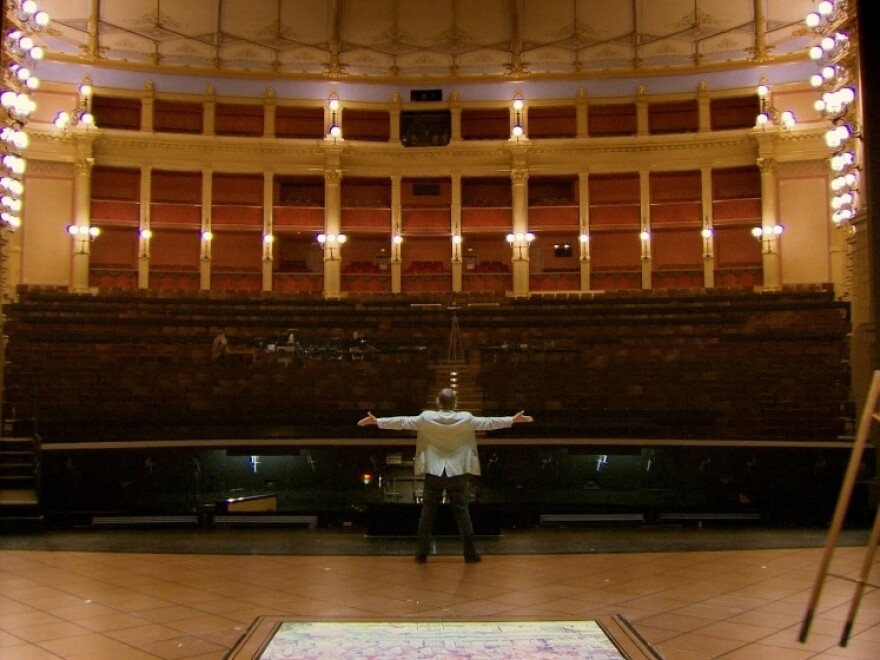British actor, writer and bon vivant Stephen Fry has loved the music of Richard Wagner since he first heard it played on his father's gramophone.
"It released forces within me," he explains early on in Wagner & Me, an exuberant and deeply personal documentary about the allure and the legacy of the German composer's work.
But as a Jew with family members who were killed in the death camps, Fry has some difficulty squaring his passion for magisterial works like Der Ring des Nibelungen and Tristan und Isolde with the anti-Semitism of the man who composed them — and, even more significantly, with the way these inherently stirring creations were co-opted by Hitler and the Nazi regime.
In Wagner & Me, directed by Patrick McGrady, Fry wrestles with a number of essentially unanswerable questions: What happens when great art springs from a mind that also gave quarter to reprehensible ideology? And is it OK to love music whose beauty and power has been harnessed, even tangentially, in the service of human evil?
Those questions don't sit lightly on Fry's affably broad shoulders. But somehow, without soft-pedaling the nastier angles of Wagner's life and legacy, Wagner & Me lands on the side of joy and defiance — broadly speaking, Fry decides not to let the terrorists win.
Dressed in an assortment of cheerful stripey tops and brightly colored trousers (generally topped with a respectful sport jacket), Fry guides us through a picture that's half bio-documentary, half breathless fan letter. The combination works, not least because Fry makes such a charming and thoughtful guide.
His tour begins at what he calls the Stratford-upon-Avon, the mecca, the Graceland for Wagner enthusiasts: the Bayreuth Festival Theater, an efficient, no-frills opera house that Wagner himself designed and built as the ideal performance spot. Fry appears to be almost beside himself with delight during a behind-the-scenes tour, as he watches wig-makers combing out fake period tresses and costumers fitting robust Valkyries for their stage outfits.

From there, he narrates a thumbnail version of Wagner's life, covering his radical political activities, his exile in Switzerland from 1849 to 1858 and his subsequent return to favor in Germany, thanks in part to the support of Ludwig II of Bavaria — aka Mad King Ludwig — who paid off the composer's considerable debts and gave him the freedom to pursue his musically ambitious ideals.
Fry, who notes early on that as much as he loves music, he's hopeless at playing any instrument, shivers with pleasure as he sits down with pianist Stefan Mickisch (at Wagner's own piano, no less) for a demonstration of the gloriously unresolved tension — musical and emotional — that marks the prelude from Tristan und Isolde. And he listens in rapture as Russian conductor Valery Gergiev explains the intricate ins and outs of interpreting and performing Wagnerian works.
But Fry's visual and aural tour is perpetually shadowed by the darker notes of the story: He points out the balcony at Bayreuth from which Hitler once addressed a crowd, noting that while tourists often trek up to stand in the spot, he can't bring himself to do so.
Still, the Wagner portrait Fry assembles in the end is that of a flawed human being who translated the glory of nature — mountains, clouds, cliffs and rocks, as one of the movie's interviewees puts it — into a sublime musical language. To view Wagner's music only through Hitler's small, opportunistically focused lens would be a grave mistake, Fry insists.
Nazis be damned; Fry ultimately takes full ownership of his love for Wagner. To paraphrase two other, later musical geniuses: They can't take that away from him. (Recommended)
Copyright 2022 NPR. To see more, visit https://www.npr.org.



